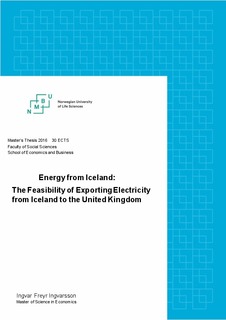| dc.description.abstract | This study examines the impact of building a subsea power cable between Iceland and the UK. It aims to provide a better understanding of the cost and benefits associated with the international liberalisation of Iceland’s electricity market. The first part of the thesis explores the simulation results of a large-scale simulation model for the European energy market (LIBEMOD), where a cable has been implemented. The model accounts for total energy produced, as well as total energy consumed, in each of the model countries, including the 27 countries of the European Union, Iceland, Norway and Switzerland.
The second part of the thesis mainly focuses on the decision for buying and selling electricity through a subsea power cable between Iceland and the UK in order to explore the arbitrage possibility, which provides a thorough account of the value of the adaptability of Icelandic hydropower. There are two interlinked issues in hydropower scheduling: i) determination of the water value; and ii) optimal bidding into the day-ahead marked conditional upon the water value, which are identified theoretically. A conceptual solution using stochastic dynamic programming is provided and is supported by a simplified version of the problem along the lines of a battery problem (i.e., a given storage with a stochastic inflow and fixed domestic demand interacting with the UK market through a day-ahead auction).
The study concludes that building a 900 MW subsea power cable between Iceland and the UK would significantly increase electricity production in Iceland due to higher prices. This would result in a considerable redistribution of welfare from consumers to producers, and an increase in welfare in the country’s energy sector by €64 million a year, compared to no cable being installed. In addition, the connection to cheap green power supplies is beneficial to the UK, where the economic welfare would increase by €41 million per year for a 900 MW cable in contrast to a scenario where there is no cable. Moreover, there is an increase in the total economic welfare of both countries when there is a higher investment resulting in a 1471 MW cable, together with an increase in the total producer and consumer surplus in both countries. | nb_NO |
